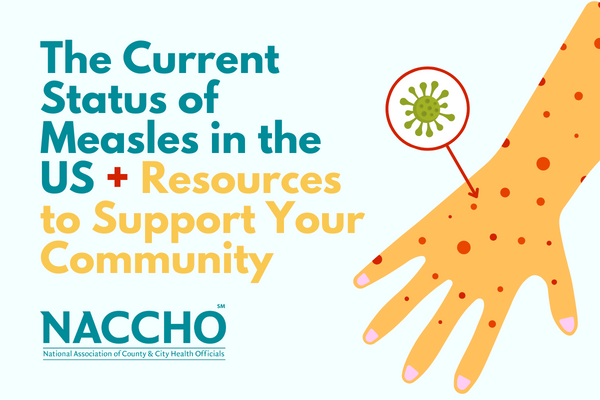Before a vaccine was developed and administered, measles would infect up to 4 million Americans and send nearly 50,000 of them to the hospital annually. In 1963, the development of a measles vaccine gave way to a highly effective vaccination program that protected millions of Americans from the virus, and in 2000, measles was declared eliminated in the United States. However, recent outbreaks of measles threaten the elimination status of the virus and underscore an increasing concern in public health that MMR vaccination uptake behaviors may be weakening.
As of March 28, 2024, 97 cases of measles have been reported in 18 jurisdictions across the United States in 2024, already exceeding the total number of recorded cases in 2023. Impacted jurisdictions to-date include Arizona, California, Florida, Georgia, Illinois, Indiana, Louisiana, Maryland, Michigan, Minnesota, Missouri, New Jersey, New York City, New York State, Ohio, Pennsylvania, Virginia, and Washington.
Measles is a highly contagious virus that can cause complications including hospitalization, pneumonia, encephalitis, and even death, particularly among young children and individuals with weakened immune systems. Up to 9 out of 10 unvaccinated individuals can contract the virus through the air from an infected person’s coughs or sneezes. In fact, for up to two hours after an infected person has left a room, the space can be contagious to unvaccinated individuals. Furthermore, asymptomatic spread of the virus is possible, as an infected individual can be contagious four days before and after developing the tell-tale measles rash.
The MMR vaccine is scientifically proven to prevent measles, mumps, and rubella. In light of these recent outbreaks, and given how contagious measles is and its evidenced potential for serious complications, vaccination is a crucial and effective way protect yourself and your community from measles outbreaks.
The current recommendation for the MMR vaccine is children receive two doses, typically administered around 12-15 months and 4-6 years of age. This vaccination schedule helps ensure optimal protection against measles, mumps, and rubella and contributes to herd immunity, reducing the risk of outbreaks in the community. Adults without documented immunity are also encouraged to receive the vaccine to prevent outbreaks and protect public health.
The following resources are provided to help local health departments and healthcare providers respond to and communicate about the recent outbreaks of measles, including messaging to encourage vaccine uptake behaviors.
Toolkits
Measles Outbreak Toolkits | CDC: Resources for healthcare providers, local/state health departments, and settings where children congregate to respond to a measles outbreak.
Catch-Up to Get Ahead Toolkit: Shareable messaging and graphics to raise awareness about catch-up immunizations during the COVID-19 pandemic.
Evidence-based Strategies and Resources to Increase Routine Vaccination Rates and Confidence: Toolkit for healthcare providers, including evidence-based strategies, tools, and resources compiled from medical professional organizations, state health departments, public health organizations, and government agencies to help increase routine immunization coverage back to pre-pandemic levels.
Immunization Campaign
CDC’s Routine Immunizations on Schedule for Everyone (RISE) Factsheets, infographics, and other resources to educate and inform routine vaccination behaviors across populations.
Resources
CDC Health Alert Network (HAN) Health Advisory: This HAN Health Advisory from March 18, 2024, provides an overview of the existing measles outbreak in the U.S. and recommendations for healthcare providers, health departments, parents and international travelers, and other resources.
Public Health Communications Collaborative: Messaging on the measles outbreak to help inform community members about the spread of the disease and what actions they can take to protect themselves and those around them.
The Vaccine Resource Hub: Resources (graphics, toolkits, videos, unbranded digital assets, messaging, etc.) about various vaccines in over 50 languages. There is also a section that includes measles resources.
Measles, Mumps, and Rubella (MMR) Vaccination | CDC: Overview of CDC’s MMR vaccine recommendations and messaging



